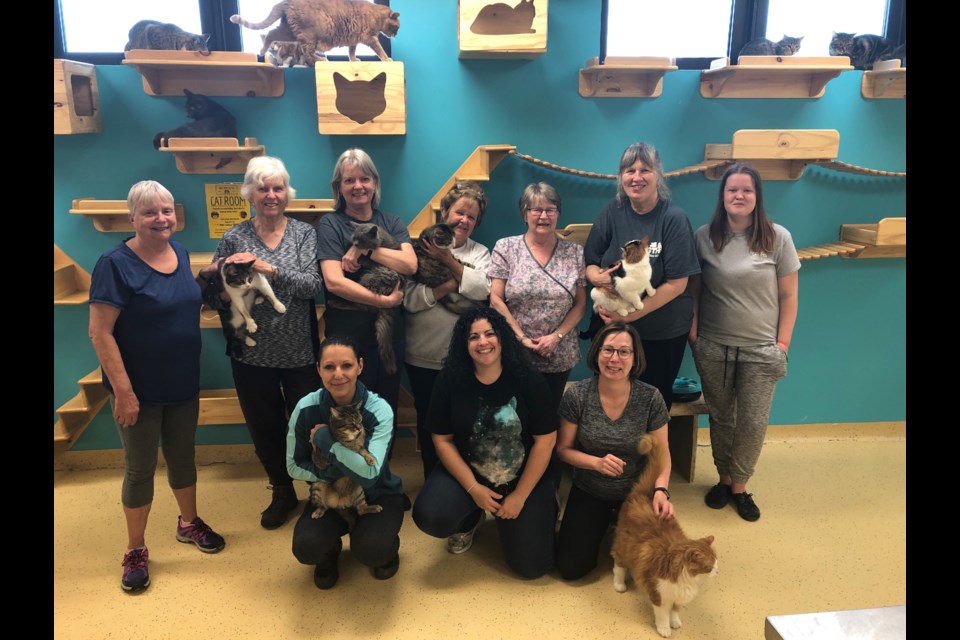Of the thousands of cats and dogs that have come through the doors of the Georgian Triangle Humane Society (GTHS) animal shelter and foster homes over the last 20 years, one recent case proved the work of the staff and volunteers is just as much about people as it is about animals.
Kilo, an orange tabby cat, was surrendered to the shelter with a broken leg. The owner, Candice, wanted to keep her beloved pet, but couldn’t afford the expense of veterinary treatment for the injury.
The GTHS covered the cost of surgery, but Kilo seemed to lack any will to recover.
Executive director Sonya Reichel said she received a call from Candice’s family letting her know Candice was also experiencing a downturn in her health after losing Kilo.
“I called her and asked if she wanted him back,” said Reichel.
Candice came in right away. As soon as the two were reunited, Kilo hopped out of bed and pressed up to the door. The cat nuzzled its owner and promptly rolled over on its back for a belly rub. Kilo went home with Candice and has stayed there since then.
It was a turning point for Reichel and her staff.
“We couldn’t allow a situation like this to happen again,” she said, determined to find more ways to keep people and pets together.
“I didn’t know if we were opening Pandora’s box,” said Reichel.
So far, there’s been no catastrophic disaster.
The GTHS has since launched three programs focused on keeping pets and people together, including pet retention, mobile, low-cost spay-neuter clinics, and a humane education program for kids and youth. This year the GTHS has also redefined its mission with a focus on the animal-human bond.
“The programs are based on the profound realization that compassion for pets is rooted in compassion for people,” said Reichel.
The pet retention program includes two streams, an emergency boarding option and emergency medical assistance.
Reichel said the GTHS is either the first or one of the first in the province to offer emergency medical assistance. The program provides vouchers to local pet owners facing an emergency requiring veterinary care and/or surgery.
“To be able to help keep pets and people together is totally magical and very gratifying,” said Reichel. "I'm hoping, if we can make it successful, we can roll it out to the rest of the province."
The change in philosophy has resonated with Reichel.
“It’s had a profound impact because we have been able to communicate and open the door to a segment of the community that is typically forgotten,” she said. “We’re helping pets we would never see … and we’re working with people who have benefited greatly from having pets in their home.”
She said while witnessing the story of Kilo and Candice pushed her and the GTHS staff to come up with programs, they couldn’t have done it without community support.
“We had to know we had the support of our community to make those first steps,” said Reichel.
The GTHS has never received government funding, and instead has relied on donations from the community to not only keep the doors open, but to build them.
The GTHS formed in 1999 without a shelter, it was volunteers and foster homes. The shelter opened for cats in 2010 and for dogs in 2011.
Reichel was the first staff member hired for the organization. She began as the shelter manager in 2012 and was given the title of executive director in 2015 when the organization changed from an operational board to a governance board.
Back then, Reichel said she remembers a strong push to build awareness in the community of the work of the GTHS, and to provide transparency and information to those who were willing to support that work.
Today, there are 17 staff, nine board members, 250 volunteers, 75 volunteer foster homes and 2,400 annual donors all supporting the GTHS organization.
There were 300 adoptions in 2011, and 1,100 in 2018.
Since opening, the GTHS has renovated the shelter's main cat room, installed stainless steel kennels, started an animal transport service taking in hundreds of dogs from underserved communities in northern Canada, and built an on-site animal hospital where they employ a veterinarian and vet technician for surgery and care of animals up for adoption.
“Our operating costs have more than tripled,” said Reichel.
But the community remains supportive of the GTHS, and donations continue to fund the efforts of the organization.
According to Reichel, the GTHS has helped more than 10,000 pets and people in its 20-year existence.
Click here to read a letter from Reichel commemorating the GTHS 20th anniversary.





